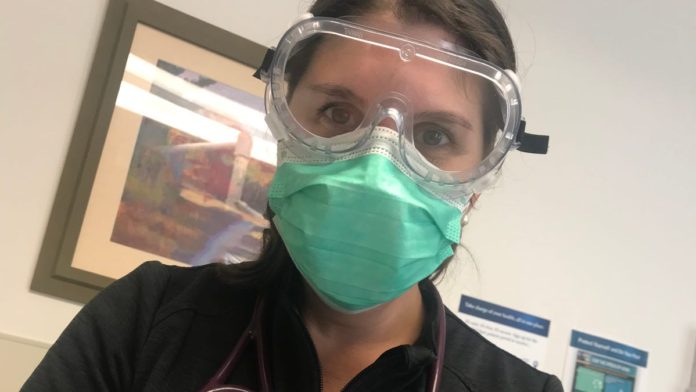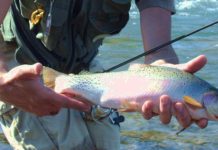Mark Blazis recounts his experience when a hook stuck in his left palm
Be careful. It’s easy to get deeply hooked on fishing. While the rewards can be exciting and belly-filling, the punishment can be unexpectedly painful, too — especially for saltwater anglers who accidentally impale themselves with big hooks. Most injuries are to the hand, scalp, back, ears or face. In tropical areas, hookings of the feet are common. The large barbs on the big hooks can make extraction impossible for all but the professionals.
While fishing for albies and jigging for black sea bass in Vineyard Sound, I made the mistake of hooking my left palm — a first in my fishing career. Primarily a fly fisherman, I’m not counting the number of times wind carried my small flies into my hat, sleeve or vest.
I was going to just leave the hook in, finish the day fishing, dock in Falmouth, and get dropped off at the hospital emergency room in Hyannis, where Dr. Nate Rudman, my frequent Amazon team partner and medical leader on expeditions into the rainforest, operates in the emergency room.
A quick call to him while still at sea, apprising him of my intentions, resulted in his suggestion to more quickly go to the Cape Cod Urgent Care Center in Falmouth. “There, without a line of people ahead of you, you’ll be in and out with the hook easily removed. They do a lot of hook extractions there.” Dr. Rudman’s advice was a great time saver.
It was beneficial that my son Matt had cut off the heavy jig, disinfected the wound, and immobilized the lure with wrappings of gauze while I was still on board. Once I arrived at urgent care, just a few minutes from the dock, the wound again was sterilized externally before I was given a shot or two to numb the area. At that point, it was necessary to force the embedded hook forward, up, and out through the skin to expose the barb, which had to be cut off first before retraction. There was no way that the hook could have otherwise been pulled out without severely damaging a lot of tissue.
The pressured, sharp hook-point easily pierced the skin to expose the barb, but the first attempt to cut through the heavy stainless-steel hook didn’t work. A more powerful set of cutters was needed. Once the barb was off, pulling the hook out was easy.
While she was getting the more powerful set of cutters, I asked my physician’s assistant, Brittany Whiting, if she had extracted many fishing hooks before. To my surprise and reassurance, she shared matter-of-factly that “hardly a day goes by here that I don’t remove at least one or two hooks from anglers.”
There are obviously a lot of anglers’ sounds from Vineyard Sound that only emergency wards hear about. While my hooking was minor and I could leave with only a tetanus shot and a prescription for doxycycline twice a day for five days, other hookings in joints, tendons, ligaments, bones, blood vessels, faces, ears and especially in and around the eyes can prove very serious and even life-altering.
That unexpected frequency brought me to curiously ask several of my most experienced captain friends about their hooking experiences. I couldn’t find one who had not been hooked.
Even great captains get hooked from time to time
Few captains are more experienced or more successful than Worcester County’s Mike Wisniewski. He’s been on the cover of On the Water and the subject of television shows. When he goes out for tuna or stripers, he gets the job done better than almost anyone I know.
When I asked him about being hooked himself, he told me about a YouTube demonstration he produced removing treble hooks from a client. Yes, Mike has been hooked himself, raked by tuna teeth, had dogfish bites, and been impaled by spines of dorsal fins.
“While I don’t seem to be sensitive to infection, some people are very susceptible to serious consequences from bacteria,” he said. “That’s the big danger.”
“Good friend Bobby Wright is one of the people highly susceptible to infection,” he continued. “Even the spine on the dorsal fin of striper that jabbed him required emergency IV treatment. Different strokes for different folks.”
Wisniewski further went back in his memory and recalled fishing friend, the late Butch Pond, getting hooked in his hand while on a party boat up in New Hampshire or Maine.
“Butch didn’t bother taking care of it —– and died of blood poisoning.”
Contaminated hooks can harbor potentially dangerous pathogens like Aeromonas, Edwardsiella tarda, Vibrio vulnificus and Mycobacterium marimun.
“You’ve got to be really careful handling sea bass this time of year,” Wisniewski said. “The hooks at the end of heavy jigs dip into high-bacteria mud bottoms and often have foul hooked fish, getting more bacteria from bellies and other fishy body parts. And their spines are loaded with bacteria, too, and can easily break off in your skin and cause a serious infection when you’re trying to unhook them.”
Wisniewski personally recalls having a 14-ounce Norwegian cod jig hook get buried in his palm.
“The first rule is to have stainless still split ring pliers to get the big lure or plug off you. You don’t want it dangling and pulling on your skin,” he said. “Try to keep just the hook — all of the hook — attached and stable, so that whoever later is going to pull it out has enough leverage. You definitely don’t want to be using a knife and putting undue pressure on the wound. The second rule is: If it’s in, leave it in. And let a professional take it out.”
Amateur extraction can cause more serious damage to skin, blood vessels, and nerves.
Billingsgate guru Capt. Wayne Bergeron shared that he’s been seriously hooked once and his mates twice. All three times he blames “uncooperative fish.”
Capt. Jason Colby shared that he’s hooked himself a number of times, and so have a few of his clients. But only once was professional help needed.
Dr. Mark Feldman, Colby’s good friend, remembers getting hooked while catching two big winter flounder at the same time. “After removing the flounder from the lower hook, the top fish flipped out of my hand, causing the lower hook to go all the way through the meat of my right thumb. The only way it was coming out was cutting the barb off and backing it out. But we didn’t have a wire cutter on board, so the only option was to tough it out, fish till we all got our limit, and then make a trip to urgent care, where the hook came out painlessly.”
One lesson is obvious from many hooking stories: Every fishing boat should carry a pair of wire cutters strong enough to cut through the biggest hooks being used, and every captain should know where he can get to urgent care the fastest.
BIg catches for local tuna fisherman
No anglers are more hooked on fishing than our local pursuers of bluefin tuna. Several of them working Cape Cod Bay succeeded last week in landing giants ranging from 400 to 800 pounds. The secret in most cases was using live mackerel or bluefish. This was the fishery that Worcester’s legendary and late Paul Kukonen pursued decades ago, having a big boat tow his skiff out to where the action was — and leaving him alone for the ultimate challenge — not unlike Hemingway’s Old Man and the Sea. Commercial fishing for tuna is restricted to Tuesdays, Fridays and Saturdays only through Nov. 30.
Unfortunately for the commercial tuna fisherman, the action has been so good that some buyers have been getting as many as 30 fish in a day, causing the supply to exceed demand – and fishermen’s rewards to sink.
International Boat Show begins Thursday
The International Boat Show, celebrating its 50th anniversary, will be held September 16-19 in Newport, Rhode Island. From 10 a.m.-6 p.m. Thursday through Saturday and 10 a.m.-5 p.m. Sunday, five sites covering more than 14 acres will display hundreds of boats in the water.
—Contact Mark Blazis at markblazissafaris@gmail.com.
Credit: Source link































